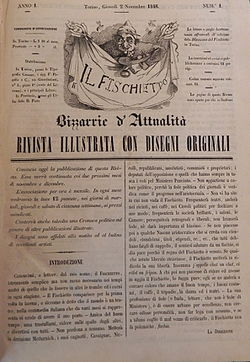Satirical magazine in Italy (1848–1916)
Il Fischietto |
| Categories | Satirical magazine |
|---|
| Founder | - Giuseppe Cassone
- Lorenzo Pedrone
|
|---|
| Founded | 1848 |
|---|
| First issue | 2 November 1848 |
|---|
| Final issue | 1916 |
|---|
| Country | Kingdom of Italy |
|---|
| Based in | Turin |
|---|
| Language | Italian |
|---|
Il Fischietto (Italian: The Whistle) was a political satire magazine published in Turin between 1848 and 1916. It was among the most important Italian satirical magazines of its time.[1] Its subtitle was Bizzarrie d'attuale - Rivista illustrata con disegni originali.[1]
History and profile
Il Fischietto was established by Giuseppe Cassone and Lorenzo Pedrone in Turin in 1848.[1][2][3] Its first issue appeared on 2 November that year.[1] Picchetti Pietro served as its director,[2] and Francesco Redenti was one of its editors.[4] The magazine came out three times per week until 1905 when its frequency was switched to biweekly.[2] It was redesigned as a weekly in 1914.[2]
The magazine covered political satire[2] and supported civil liberties, freedom of speech and freedom of the press.[1] Casimiro Teja was among the notable contributors of Il Fischietto.[4] It targeted different groups, including government ministers, and had a liberal and anti-clerical political stance.[4][5] It generally supported the politicians Giuseppe Garibaldi, Bettino Ricasoli and Cavour.[4]
Its circulation was about 3,000 copies in the 1850s, but the magazine enjoyed higher levels of readership in the 1860s.[4]
Il Fischietto folded in 1916.[1][2]
References